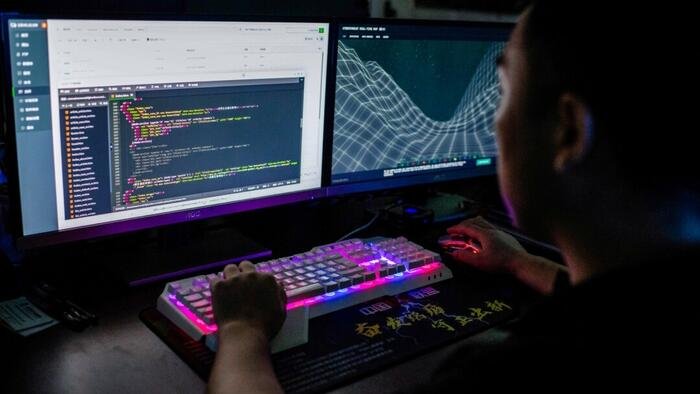Authored by John Mills via The Epoch Times,
A recent report by The Wall Street Journal shed light on a groundbreaking meeting that took place in December 2024, focusing on the persistent cyberattacks targeting critical U.S. infrastructure. During this summit, approximately 12 U.S. national security officials engaged in frank discussions with their Chinese counterparts.
This meeting marked a significant milestone as it was the first time China acknowledged that the Volt Typhoon and Salt Typhoon cyber intrusions originated from the Chinese regime.
“The Chinese official’s remarks at the December meeting were indirect and somewhat ambiguous, but most of the American delegation in the room interpreted it as a tacit admission and a warning to the U.S. about Taiwan, a former U.S. official familiar with the meeting said,” the Journal reported.
Insight into Chinese Cyber Attacks
The Volt Typhoon cyber intrusion was first publicly disclosed in early 2023, with Microsoft and the Department of Homeland Security identifying cyber intrusions into critical infrastructure in Guam. A Chinese state-sponsored group was identified as the perpetrator, with one U.S. official suggesting this was part of a broader Chinese intelligence-gathering initiative.
The Cybersecurity and Infrastructure Security Agency (CISA) released an advisory highlighting the concept of “living off the land.” An article speculated whether this incident signaled potential preparation for a Chinese attack.
In 2024, congressional testimony from former FBI Director Wray and former CISA Director Jen Easterly painted a grim picture. Easterly characterized the Chinese actions as concerning, stating, “This is truly an ‘Everything Everywhere, All at Once’ scenario.” The recent Journal article delved deeper into the motives behind China’s cyber intrusions, linking them to U.S. policy support for Taiwan and highlighting the escalating tensions between the two superpowers.
Ensuring Leadership Accountability in Cybersecurity
President Donald Trump’s initial executive order on cybersecurity during his first term emphasized the importance of leadership accountability.
The executive order emphasized:
“The President will hold heads of executive departments and agencies (agency heads) accountable for managing cybersecurity risk to their enterprises. In addition, because risk management decisions made by agency heads can affect the risk to the executive branch as a whole, and to national security, it is also the policy of the United States to manage cybersecurity risk as an executive branch enterprise.”
The order made it clear that cyber breaches would reflect directly on the senior leadership of the affected departments and agencies.
The insights from the December 2024 Geneva meeting may shed light on the recent changes in leadership at Fort Meade, Maryland.
China’s relentless cyber campaign since early 2023 has targeted various sectors of U.S. critical infrastructure, including power, water, telecommunications, air traffic control, and maritime navigation systems.
Implementing Strategic Leadership Changes
Retired Lt. General Michael Flynn, Trump’s former national security adviser, emphasized the need for more leadership changes, drawing parallels to Gen. George Marshall’s strategic adjustments during wartime.
Industry expert Herm Hasken highlighted the extensive nature of China’s cyber intrusions across all critical infrastructure sectors, suggesting that the public may not be fully aware of the magnitude of the threat.
Retired Secret Service Senior Executive Robert Rodriguez expressed industry concerns regarding the ongoing Salt Typhoon cyberattacks orchestrated by the Chinese regime.
He emphasized the formation of a coalition to address these pervasive cyber intrusions and underscored China as the primary threat to the U.S. and global cybersecurity.
A recent Senate Hearing delved into the Salt Typhoon cyberattacks, highlighting bipartisan dissatisfaction with the U.S. government’s response to Chinese cyber intrusions.
“I think the American people need to know the extent of the breach here, I think they will be shocked at the extent of it,” Sen. Josh Hawley (R-Mo.) commented, emphasizing the severity of the situation.
“I think they need to know about their text messages, their voicemail, their phone calls. It’s very bad, it’s very, very bad, and it is ongoing,” he added.
Former Senate Intelligence Committee Chair Mark Warner raised concerns about the significant gaps in U.S. cybersecurity readiness and the continued presence of Chinese intruders within critical systems.
The unrelenting Chinese cyber assault, as outlined in The Wall Street Journal’s report on the high-level Geneva security summit, likely played a crucial role in prompting changes in U.S. cybersecurity leadership.
Opinions expressed in this article are those of the author and do not necessarily reflect the views of The Epoch Times or ZeroHedge.
Loading…
The sentence is missing. Please provide the sentence that needs to be rewritten.

